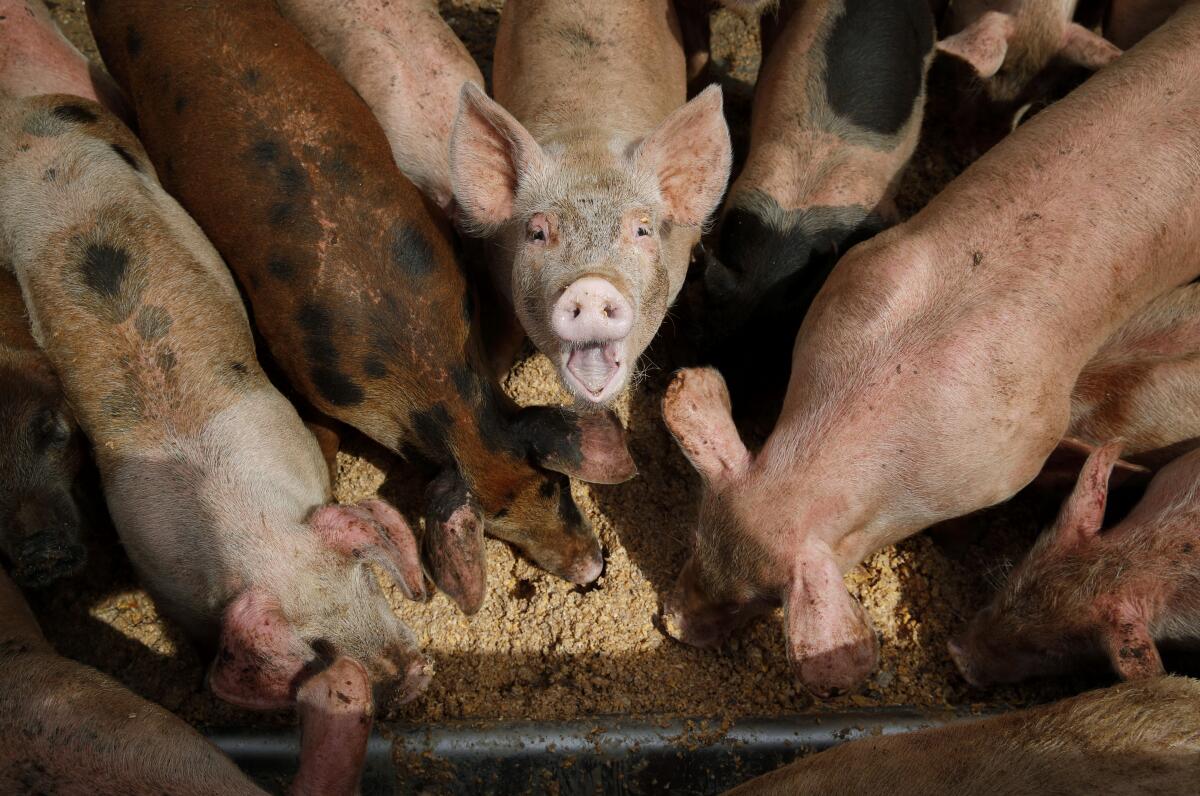Opinion: The Supreme Court says California can regulate pork. That’s big, even if you’re not a pig

- Share via
The Supreme Court issued a major ruling Thursday upholding a California animal-cruelty law and therefore the authority of state and local governments to regulate what’s sold within their borders. Although the justices were splintered over the proper reasoning and disposition of the case, the ruling rejected an argument that would have greatly weakened states’ power to protect their residents from pollution and much more.
The case involved a California initiative, Proposition 12, that forbids the sale of meat from pigs that are “confined in a cruel manner.” Overwhelmingly approved by voters in 2018, the law defines confinement as “cruel” if it prevents a pig from “lying down, standing up, fully extending [its] limbs, or turning around freely.”
The National Pork Producers Council and the American Farm Bureau Federation challenged the law under an important but relatively arcane principle of constitutional law known as the “dormant commerce clause.” It provides that state and local laws are unconstitutional if they place an excessive burden on interstate commerce. The Constitution doesn’t say that, but the Supreme Court has articulated and applied the doctrine since early in the nation’s history.
Trade barriers among the states were a major impetus for the Constitutional Convention of 1787. States with ports charged landlocked states high fees to access them, for example, provoking retaliation from those states. The idea behind the dormant commerce clause, inferred from Congress’ power to regulate interstate commerce under Article 1, is that free trade among the states is essential and that every producer should have access to all domestic markets.
Based on that principle, the pork producers alleged that Proposition 12 violates the Constitution by impermissibly burdening interstate commerce. Most of the pork sold in California is produced out of state, much of it in Iowa, so the plaintiffs claimed the state was unconstitutionally attempting to regulate commerce outside its borders.
If the Supreme Court had accepted this argument, the implications would have been enormous. California probably would not be able to set stricter emissions standards for vehicles, for instance, because most are manufactured in other states. A recently adopted New York law prohibiting natural gas heating and stoves in new buildings may not be allowed because the fossil fuel is produced almost entirely in other states. A state might not be able to prevent the use of a pesticide manufactured elsewhere. The examples are endless.
Fortunately, the Supreme Court followed well-established principles in rejecting the challenge to the California initiative. Although the justices wrote several concurring and dissenting opinions, they found sufficient agreement on the basic framework for analysis.
One principle central to the ruling is that a state or local law that treats in-staters and out-of-staters differently is presumed unconstitutional. For example, Michigan‘s law allowing in-state but not out-of-state wineries to sell directly to consumers through the mail was found unconstitutional by the Supreme Court.
As the court has previously explained, the Constitution prohibits enforcement of state laws driven by “economic protectionism — that is, regulatory measures designed to benefit in-state economic interests by burdening out-of-state competitors.” California’s Proposition 12 is not discriminatory in this way. It applies the same standards for pork sold by both in-state and out-of-state companies. In fact, the challengers did not claim that the California law is discriminatory or protectionist.
The Supreme Court has long held that a nondiscriminatory state law should be upheld unless its burdens on interstate commerce are clearly excessive in relation to its benefits. Several of the justices observed that there is no indication that the California law would place a significant burden on interstate commerce or that it is clearly excessive in light of the state’s interest in ensuring that pork is humanely produced. Ultimately, the Supreme Court ruled that California officials and voters may regulate what is sold in California so long as they treat in-state and out-of-state producers alike.
Under the Constitution, Congress could use its power to regulate interstate commerce to override Proposition 12 and decree national standards for pork production. But until it does, states should be able to decide for themselves. As Justice Neil M. Gorsuch wrote for the majority, “While the Constitution addresses many weighty issues, the type of pork chops California merchants may sell is not on that list.”
The decision is not remarkable in that it follows decades of precedent. Its significance is that it did not impose significant new restrictions on states’ regulatory power. But given how readily the Roberts court has abandoned precedents and ruled in favor of business and against regulation, it is notable and welcome.
Erwin Chemerinsky is a contributing writer to Opinion and the dean of the UC Berkeley School of Law. His latest book is “Worse Than Nothing: The Dangerous Fallacy of Originalism.”
More to Read
A cure for the common opinion
Get thought-provoking perspectives with our weekly newsletter.
You may occasionally receive promotional content from the Los Angeles Times.










